- Home
- Neal Stephenson
Anathem Page 48
Anathem Read online
Page 48
“A miracle,” Yul said.
“A visitation from another world, purer and better than ours,” I guessed.
“Where the evil conspiracy doesn’t exist,” Cord said. “Come to reveal the truth.”
“What about the laser light shining down on the Three Inviolates?” Sammann asked. “How would they interpret that?”
“Depends on whether they know that the Three Inviolates are nuclear waste dumps,” I said.
“What!?” the Crades exclaimed.
“Even if they do know that,” Cord said, “they’d probably give it a more spiritual interpretation.”
Gnel was still a little off balance, but he put in, “The Warden of Heaven sees the Thousanders as the good guys.”
“Of course,” I said. “They know the truth but they can’t get the word out because they’re bottled up by conniving Tenners and Hundreders, is that it?”
“Yes,” Gnel said. “So he would interpret the laser light as—”
“A blessing,” Cord said.
“A benediction,” I said.
“An invitation,” Yul said.
“Boy, are they in for a surprise!” Sammann said delightedly.
“Probably. Maybe. We don’t know. I just hope it isn’t a nasty surprise for Jesry,” I said.
“Jesry the bastard?” Cord said.
“Yeah,” I said, and chuckled. “Jesry the bastard.”
I was feeling good because it felt like we’d gotten through this without having to endure a sermon from Ganelial Crade; but my heart fell into my gut as Cord turned to him and asked, “Where did the Warden part company from your faith, Gnel?” The last part of this sentence was a little rushed and muffled because Yul had playfully reached around her shoulder to clap his hand over her mouth, and she was twisting his fingers backwards as she talked.
“We read the scriptures ourselves in the original Bazian,” Gnel said, “so you might imagine that we are primitive fundamentalists. Maybe we are in that sense. But we aren’t blind to what has happened in the mathic world—Old and New—in the last fifty centuries. The Word of God does not change. The Book does not suffer editing or translation. But what men know and understand outside of the Book changes all the time. That’s what you avout do: try to understand God’s creation without using the direct revelations given to us by God almost six thousand years ago. To us you’re like people who’ve put out your own eyes and are now trying to explore a new continent. You’re grievously handicapped—but for that reason you may have developed senses and faculties we lack.”
After a few moments’ silence, I said, “I’m just going to hold my tongue and not even get into all that is wrong in what you’ve just said. The gist of it seems to be that we aren’t evil or misguided. You think that in the end we’ll agree with the Book.”
“Of course,” said Gnel, “it has to be that way. But we don’t think there’s a secret conspiracy to hide the truth.”
“He believes your confusion is genuine!” Yul translated. Gnel nodded.
“That’s very considerate of you,” I said.
“We preserved the notebooks of Saunt Bly,” Gnel said. “I’ve read them myself. It’s obvious he was no Deolater.”
“Excuse me for saying so,” Sammann said—this was always how he opened when he was going to insult someone—“isn’t it a little nutty for a bunch of Deolaters to found a religion based on the writings of someone they know to have been an atheist?”
“We identify with his struggle,” Gnel said, not the least bit insulted. “His struggle to find the truth.”
“But don’t you already know the truth?”
“We know those truths that are in the Book. Truths not therein we feel but we don’t know.”
“That sounds like something—” I began, then bit my tongue.
“That an avout would say? Like Estemard? Or Orolo?”
“Let’s not bring him into this, please.”
“Fine.” Gnel shrugged. “Orolo kept to himself. Preserved the Discipline, as near as I could tell. I never talked to him.”
Here I had to draw back. Count to ten. Take out the Rake. These people cared about eternal truths. Believed that some—but not all—such truths were written down in a book. That their book was right and the others wrong. This much they had in common with most of the other people who had ever lived. Fine—as long as they left me alone. Now they had this new wrinkle: they drew inspiration from a Saunt of the avout. It was not important that I be able to make sense of this.
“You feel the truth but you don’t know it,” Cord repeated. “Your service the other day, in Samble—we could hear your singing. It was very emotional.”
Gnel nodded. “That’s why Estemard attends—though he doesn’t believe.”
“He’s not intellectually convinced of your arguments,” Cord translated, “but he feels some of what you feel.”
“That’s exactly it!” Ganelial Crade was delighted. A strange thing to relate. But he was. As if he’d found a new convert.
“Well, even for one who doesn’t believe, I can sort of understand the attraction,” Cord said.
I gave her a look. Yul clapped his hands over his face. Cord became defensive. “I’m not saying I’m likely to join this ark. Just that it was remarkable, after driving through the middle of nowhere for hours, to come upon this building where people were gathered together and to feel the emotional bond that they shared. To know that they’ve been doing it for centuries.”
“Our ark, our towns like Samble,” Gnel said, “they are all dying. That’s why those services are so emotionally intense.”
This was the first thing he’d ever said that didn’t bristle with confidence, so we were taken aback by it. Yul took his face out of his hands and blinked at his cousin.
“Dying because of the Warden of Heaven?” Sammann guessed.
“He preaches a simple, unsubtle creed. It spreads like a disease. Those who adopt it turn around and spurn us as if we were the heretics. It is wiping us out,” Gnel said, and aimed a none too friendly look at Yul.
This was all very interesting but I had other stuff to think about. So Estemard has gone off the deep end. Has Orolo?
I recalled the conversation I’d had with Orolo just before the starhenge had been closed—the one about beauty. The one that had saved my life. In retrospect it could be seen as the moment when Orolo’s mind began to crack. As if he had started and I’d stopped being crazy at the same moment.
I shook it off. Orolo had been Thrown Back. He’d had only one place to seek refuge: Bly’s Butte. Once there, he’d observed the Discipline. No singing in the ark for him. And he had gotten out of the place as soon as he’d been able to.
Well—
Wait a minute. Not as soon as he’d been able to. He had departed for the north only a couple of days before we had—the morning after the lasers had shone down upon the Three Inviolates. Why would that cause him to pack up his bolt, chord, and sphere, and hurry to Ecba, of all places?
Maybe in a few days I could just ask him.
* * *
Allswell: A naturally occurring chemical that, when present in sufficient concentrations in the brain, engenders the feeling that everything is fine. Isolated by theors in the First Century A.R. and made available as a pharmaceutical, it became ubiquitous when a common weed, subsequently known as blithe, was sequence-engineered to produce it as a byproduct of its metabolism. Blithe was subsequently made one of the Eleven.
—THE DICTIONARY, 4th edition, A.R. 3000
The journey lasted about two days—or, up here, two waking-and-sleeping cycles. I was all of a sudden ready to get back to work. The journey from Samble to the sledge port had been a welcome respite from reading and thinking, but seeing Jesry had shocked me awake. I might be sleeping twelve hours at a time and watching speelies, but my friends were working as hard as ever and going off on dangerous missions. It was difficult for me to act on this, though. The continuous vibration and occasional jarring shifts of
the sledge train were about as far as you could get from the cloister. Reading and writing were difficult; even watching speelies was hardly worth it. Going outside was out of the question. I could understand why so many people up here were substance abusers.
Before we’d departed, Sammann had done research on how to sneak across the border without documents. Economic migrants did this all the time and some of them had logged their experiences, which gave me a rough idea of what and what not to do. The most important thing not to do was to ride the sledge train the whole way. Apparently the sledge port on the other side was a much more fastidious operation than the one we’d passed through. Officials would board the train at an outpost a couple of degrees north of the port and make a sweep down the length of the train during the last few hours of the journey. You could try to hide from them but this was chancy. Instead, illegals tended to jump off the train just short of the outpost and make deals with local sledge-men who would spirit them past the border post.
These came in two categories. The older, more established smugglers had bigger, long-haul sledge trains that they would drive over the mountains to the icebound coast, a couple of hundred miles away. There was also a newer breed using small, nimble, short-range snow machines just to circumvent the sledge port itself. We were hoping to get me on one of those. But the little ones couldn’t operate in foul weather. Of course, all of this smuggling could have been stopped if the Saecular Power had been serious about doing so, but it seemed they were willing to look the other way as long as illegals showed them the courtesy of being a little bit sneaky.
Because of the Cousins’ jamming the nav satellites we could not know our latitude, but we could guess how far we’d come by dead reckoning. When we thought we were getting close, I put on all the warm stuff I had and topped off the fuel bladder in my suitsack. The backpack I’d been issued at Voco was too small, too new, and too nice-looking, but Yul said he had an old one in his fetch that was bigger, with a metal frame. So we bundled ourselves up and made our way back over the catwalks to the flatbed in the rear. Our backs were to the wind but we staggered and flailed as the sledges bucked over ridges in the ice. We had to shovel three feet of snow off his vehicle. More snow began to fall while we were doing this, and at times it seemed to come down faster than we could get rid of it. But eventually we got into the back of Yul’s fetch and found an old military backpack that wouldn’t be too conspicuous in the company I’d soon be keeping. I transferred the contents of my little rucksack into it. We filled the remaining volume with energy bars, spare clothes, and other odds and ends, and strapped a pair of snowshoes to the sides just in case.
Back at the head of the train, Gnel supplied me with coins: enough to pay for passage if I haggled, not enough to stain me as rich. Sammann printed out a map of the region around the sledge port. Cord gave me a hug and a smack on the cheek. I went out on the catwalk, pulled the fake-fur fringe of my hood out to shield my face from wind blast, and looked out the left side of the train. Like a litter of cubs following their mother, three much smaller sledge trains were now shadowing us on that side. They’d materialized out of the storm in the last quarter of an hour. Each consisted of a tracked snow-crawler drawing a few sledges behind it. Some of those sledges were open boxes or flatbeds. These were for smuggling goods, and indeed one was now being laden; it had pulled alongside the third sledge in our train, and men were throwing boxes and kicking gravid bags down into it. Others, though, were covered—tents had been pitched on their backs. I spied a couple of men in orange suitsacks vaulting down into one of those.
Sammann had given me one guideline and two rules. The guideline: get on a sledge with lots of other passengers. There’s safety in numbers. Rule 1: don’t let your feet touch the surface. You’ll be abandoned and you’ll die. Rule 2 I’ll get to presently.
Gnel and I paced the catwalks for a quarter of an hour, hoping to see something smaller than these three trains. Tiny as they might have seemed next to the giant sledge train, they were quite a bit bigger than most vehicles you’d see on a road down south. They were probably bound west over the mountains. We did not see any of the smaller, more agile vehicles that made short-range smuggling runs in the vicinity of the sledge port. None of them was out today—probably because of the foul weather.
One sharp-eyed sledgeman spied me. He gunned his engine, coughing out a roil of black exhaust, and pulled alongside. He had only one sledge behind his crawler. He slid his window open and stuck his ruddy, hairy face out and quoted a price. I walked back a few steps so that I could look into his sledge. Empty. He quoted a lower price before I said a word.
It didn’t feel right to jump into the first one that came along, so I shook my head, turned away, and headed back toward where a larger train was taking on passengers. This operation seemed more professional—if that word made any sense here—but I’d arrived late. The sledges were already crowded with what looked like organized bands of migrants whose stares suggested I wouldn’t be welcome. And the price was high. A third, smaller train of mixed cargo and passenger sledges looked more promising: there were enough passengers aboard that I didn’t fear being abandoned.
Seeing me and a couple of other singletons in negotiations with the driver of that train, the first sledgeman swooped in again. He pulled ahead so that I could look in through the flaps of the tent on his sledge and see that he’d taken on two passengers. The door of his crawler was hanging open, so I could see his control panel. A glowing screen was mounted above it, showing a jagged trace that scrolled horizontally as we moved: a sonic. Rule 2 was that I should never entrust myself to a sledge that lacked one. It used sound waves to probe the ice ahead for hidden crevasses. Most crevasses could be bridged by the tractor’s long treads, but some might swallow it and everything in train behind it.
I asked the driver where he was headed: “Kolya,” he answered. The longer, mixed passenger-cargo train was bound for another place called Imnash. The next icebreaker, we knew, was scheduled to leave from Kolya in thirty-one hours. So, having agreed on a price, I heaved my backpack down into the one-sledge train and became its third passenger. According to custom, I paid the driver half of the agreed-on fare up front and kept the other half in my pocket, payable on arrival. For another quarter of an hour he jockeyed for position along both flanks of the train, and managed to collect one more passenger on the right side. By that point, no one remained on the catwalks. All of the little sledge trains peeled away from the big one as if they’d received a common signal. I reckoned we must be drawing close to the outpost where the inspectors would board the train.
From fifty feet we could barely see the giant train; from a hundred it was invisible. A minute after that even the throbbing of its power plant had been muffled by the snow and drowned out by the higher-pitched note of our little train’s motor.
This was hardly the sort of thing I’d had in mind when I’d walked out of the chancel at the big Voco two weeks earlier! Even when I’d made the decision to follow Orolo over the pole, I hadn’t dreamed that the last leg of the journey was going to be like this. If someone had told me back at Samble that I was going to have to go on a ride like this one, I’d have come up with an excuse not to, and gone straight to Tredegarh. What wouldn’t have been clear to me, though, back in Samble, was just how routine this all was. People did it all the time. All I needed to do was kill twenty-four hours, which was how long it would take for this contraption to reach the sea.
We four passengers sat on a pair of sideways-facing benches that could have accommodated eight. We all looked about the same in our suitsacks. Mine was new compared to theirs even though I’d been living in it for a week. Despite the trouble we’d gone to to outfit me with desperate-looking baggage, mine still gleamed in comparison with the first two passengers’: poly shopping bags bound up with poly twine and reinforced with poly tape. The last passenger had an old suitcase bound up in a neat gridwork of yellow rope.
The first two called themselves Laro and Dag,
the last was Brajj, all of these being reasonably common extramuros names. I said my name was Vit. Further conversation was difficult over the engine noise and in any case these guys didn’t seem very talkative. Laro and Dag huddled together under a blanket. I had the idea that they were brothers. Brajj, having entered last, sat closest to the flaps in the rear. Between his bulk (he was a little bigger than I) and his clumsy suitcase he claimed a lot of space. But it was space that we were glad to let him have because of the snow that swirled in from the sledge’s coiling wake.
I’d left all my books with Cord. No one had a speely. There was nothing to see outside but swirling snow. I set my catalytic heater to the lowest power level that would keep my digits alive, folded my arms, propped my legs up on my pack, slumped down on the wooden bench, and tried not to think about how slowly time was passing.
It seemed like years since I’d been in the comfortable surroundings of the concent. But here on this sledge I’d gone into a daydream where I could practically see my fraas and suurs in front of me and hear their voices. From Arsibalt, Lio, and Jesry, I moved on to the decidedly more enjoyable image of Ala. I was fancying her at Tredegarh, a place of which I knew little except that it was older and much bigger than Saunt Edhar, and that the climate was better, the gardens and groves lusher and more fragrant. I had to interpolate a fantasy wherein I survived this trip, found Orolo, got back to Tredegarh, and was allowed in the gate as opposed to being Thrown Back or spending the next five years with nothing except the Book to keep me company. Having got those formalities out of the way, I conjured up a half-waking dream of a fine supper in a rich old Tredegarh refectory at which fraas and suurs from all over the world raised glasses of really good-tasting stuff to me and Ala for having made those pinhole camera observations. Then the daydream took a more private turn involving a long walk in a secluded garden…this made me drowsy. It was not turning out as I’d expected. Whatever part of my mind was in charge of daydreams was shaping this one to comfort me and lull me, not to arouse passions.

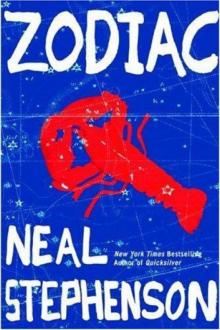 Zodiac: The Eco-Thriller
Zodiac: The Eco-Thriller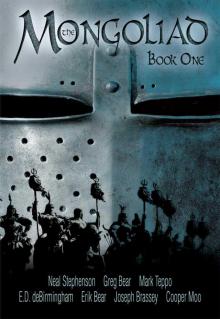 The Mongoliad: Book One
The Mongoliad: Book One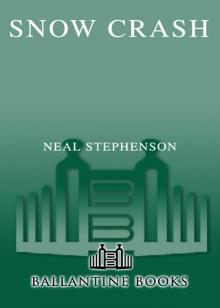 Snow Crash
Snow Crash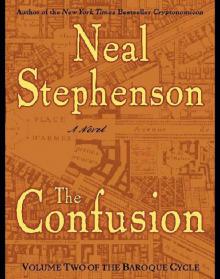 The Confusion: Volume Two of the Baroque Cycle
The Confusion: Volume Two of the Baroque Cycle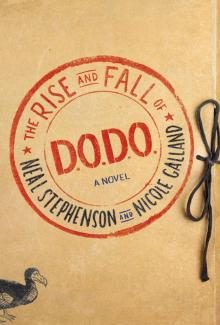 The Rise and Fall of D.O.D.O.
The Rise and Fall of D.O.D.O.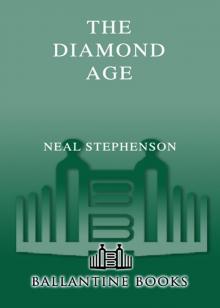 The Diamond Age: Or, a Young Lady's Illustrated Primer
The Diamond Age: Or, a Young Lady's Illustrated Primer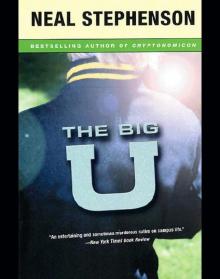 The Big U
The Big U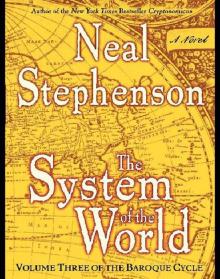 The System of the World: Volume Three of the Baroque Cycle
The System of the World: Volume Three of the Baroque Cycle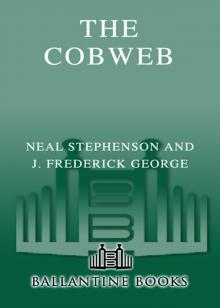 The Cobweb
The Cobweb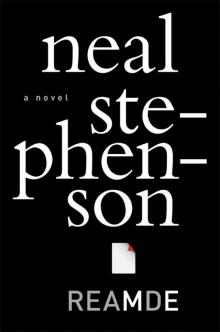 Reamde
Reamde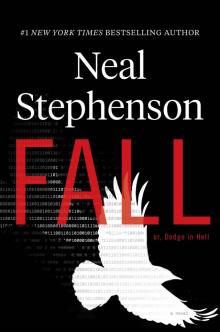 Fall; or, Dodge in Hell
Fall; or, Dodge in Hell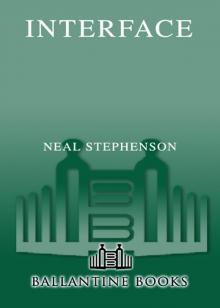 Interface
Interface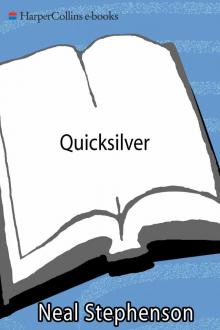 Quicksilver
Quicksilver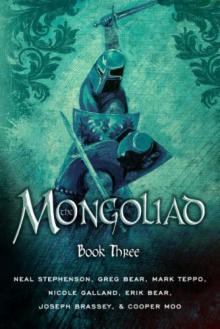 The Mongoliad: Book Three
The Mongoliad: Book Three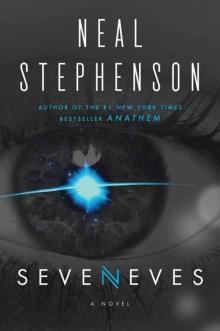 Seveneves
Seveneves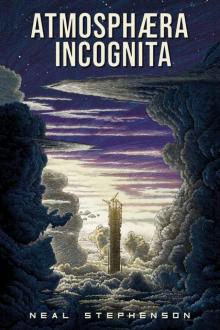 Atmosphæra Incognita
Atmosphæra Incognita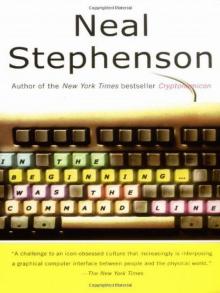 In the Beginning...Was the Command Line
In the Beginning...Was the Command Line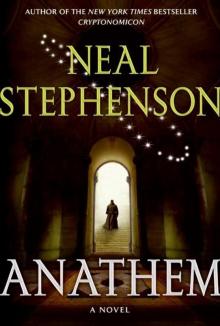 Anathem
Anathem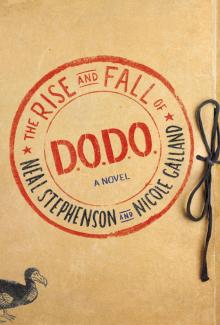 The Rise and Fall of D.O.D.O.: A Novel
The Rise and Fall of D.O.D.O.: A Novel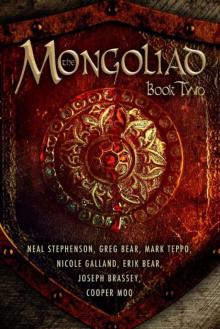 The Mongoliad: Book Two
The Mongoliad: Book Two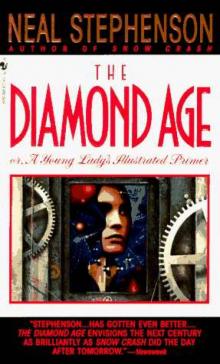 Diamond Age or a Young Lady's Illustrated Primer
Diamond Age or a Young Lady's Illustrated Primer THE System OF THE WORLD
THE System OF THE WORLD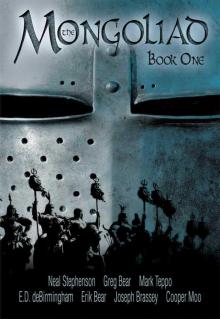 The Mongoliad: Book One tfs-1
The Mongoliad: Book One tfs-1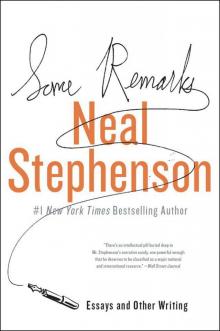 Some Remarks: Essays and Other Writing
Some Remarks: Essays and Other Writing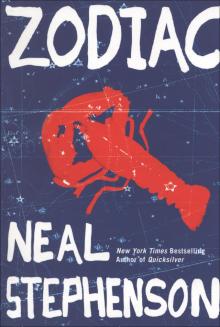 Zodiac
Zodiac Spew
Spew The Baroque Cycle: Quicksilver, the Confusion, and the System of the World
The Baroque Cycle: Quicksilver, the Confusion, and the System of the World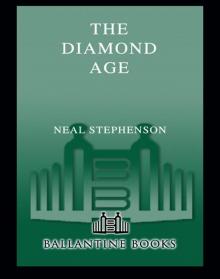 The Diamond Age
The Diamond Age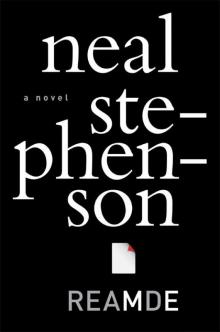 Reamde: A Novel
Reamde: A Novel In the Kingdom of Mao Bell
In the Kingdom of Mao Bell Mother Earth Mother Board
Mother Earth Mother Board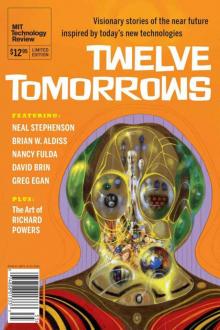 Twelve Tomorrows - Visionary stories of the near future inspired by today's technologies
Twelve Tomorrows - Visionary stories of the near future inspired by today's technologies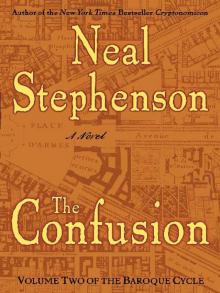 The Confusion
The Confusion The Great Simoleon Caper
The Great Simoleon Caper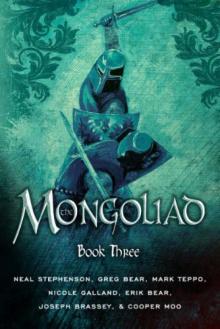 The Mongoliad: Book Three tfs-3
The Mongoliad: Book Three tfs-3